Best Radio Event in the World ? Pt 1
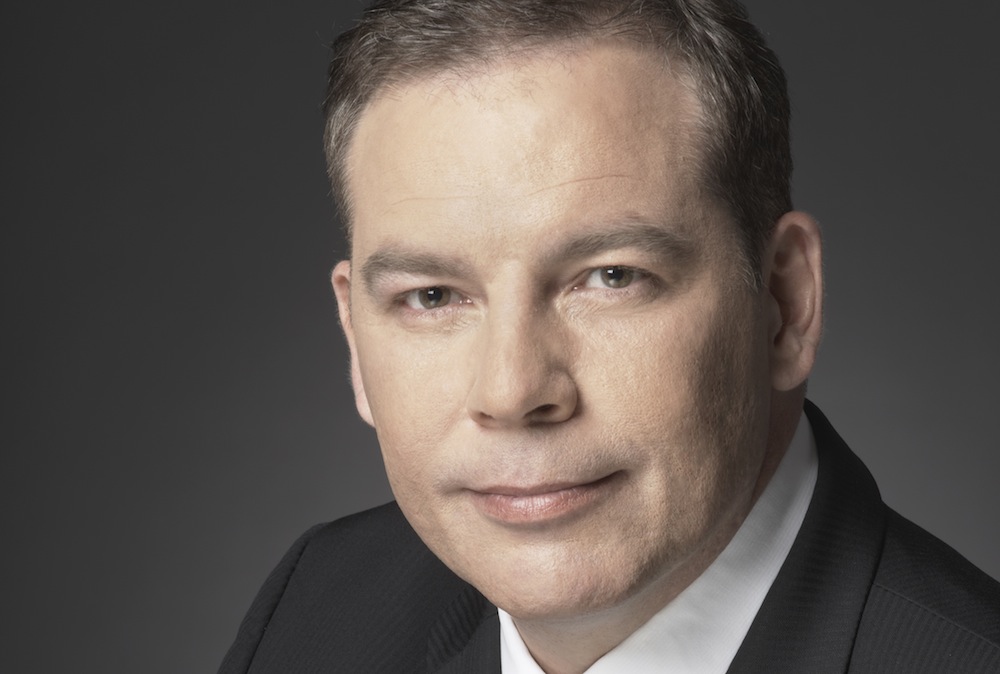
In just three years, the Radio Days Europe conference has snowballed to become the world’s most significant annual radio industry event.
With 1,200 participants representing commercial, public, and state broadcasters from 50 countries – and a choice of almost 60 thought-leading sessions, covering everything from programming strategy to storytelling to talent to technology – Radio Days Europe is also on the verge of becoming the largest radio industry event on the planet. It would be hard to argue that RDE isn’t already the most important, diverse, and forward-looking radio conference in the world. Here’s why…
(And why you should try to get yourself to Radio Days Europe 2014 in Dublin, Ireland)
Join SCA’s Craig Bruce, BP&R’s Peter Don and Wayne Clouten, and MMH’s Alex Dean as they share their highlights of this year’s RDE in Berlin with Scott Muller…
Radio Days Europe was launched in Copenhagen, Denmark, in 2010. In just three years RDE has become the most significant radio industry event in the world.
The ultimate aim: make better radio for listeners.
The means: present development opportunities and strategic insights for broadcasters – what’s next in programming and formats, audience behavior, digital platforms, and business models?
The difference: RDE is attended by experts and professionals from all levels and roles throughout the radio industry – from commercial to public to state broadcasters* – and representing every format you could imagine, from speech/talk formats to entertainment/music formats – to hybrids and niches you probably couldn’t imagine.

Berlin, Germany. Host city for Radio Days Europe 2013
Source: Shutterstock here or here
At RDE 2013 in Berlin there were almost 60 thought-leading sessions, covering every radio-related topic imaginable. The emphasis is on high quality, informative, candidly open, and practical sessions. And, quite unusually and very unlike some other radio events, there was virtually no gratuitous self-promotion of products/services by session presenters. This was a welcome and polar contrast with “American-ised” industry events. No self-plugging. Very European.
The unbeatable bonus: RDE offers an unparalleled opportunity to meet people from the same industry – yet from radically different cultures/backgrounds and from very different organisations, often facing completely different challenges to your own. That experience of “looking at the same universe but from the inside out, and through a kaleidoscope-app” can spark some of the greatest ideas you’re ever likely to come up with.
There were too many great sessions and moments to list here. Some of the most fascinating were things like Scandinavian public broadcasters innovative use of on-air and social media to drive significant social and legal changes. However, to keep this summary of RDE relevant for Radio Today readers in Australia, here are the highlights from the perspectives of fellow Australian programmers and consultants who were there in 2013 – and some great reasons why it’s worth you going to RDE 2014 in Dublin, Ireland.

The Australian Contingent – L-R: Sam Cavanagh SCA, Craig Bruce SCA, James O’Brien ABC, Peter Don BPR, Scott Muller MBOS, Alex Dean MMH Russia
For emailing me their thoughts on the RDE’s highlights, my sincere thanks to:
- Craig Bruce, Head of Content for Southern Cross Austereo
- Peter Don and Wayne Clouten, Principals and Directors of Broadcast Programming & Research
- Alex Dean, the new Group Programming Consultant for Multi Media Holdings in Moscow, Russia (congratulations on the great new role, Alex)
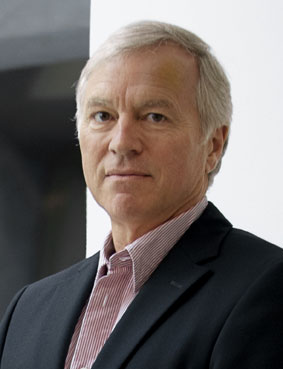 Peter (left): The unique aspect of this conference is the mix of public and commercial broadcasters which provides a focus on areas that commercial radio stations often don’t have the time or resources to fully explore – some examples – the Digital Future (Where does digital radio stand today), Hybrid Radio, presented by a panel comprising a mix of commercial and public radio experts.
Peter (left): The unique aspect of this conference is the mix of public and commercial broadcasters which provides a focus on areas that commercial radio stations often don’t have the time or resources to fully explore – some examples – the Digital Future (Where does digital radio stand today), Hybrid Radio, presented by a panel comprising a mix of commercial and public radio experts.
(And) it’s refreshing to have an alternative to the relatively single-minded U.S.A-based radio mantra, balanced by the perspectives of large radio operators in large markets doing things differently. What RDE does share with all others however is the celebration of success in a wide range of radio markets.
Scott: RDE was refreshingly positive. For the most part, the sessions shared an inspiring and positive view of radio’s future, embracing rather than fearing the internet, technology and change.
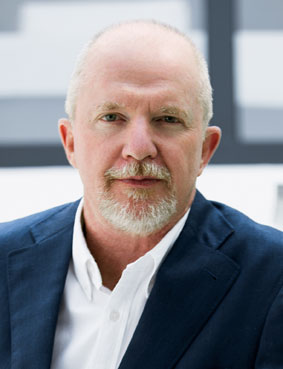 Wayne (right): The great value of conferences like Radio Days is not so much the presentation content itself but the sharing of experiences by the presenters, which in turn stimulates conversations and ideas during the breaks. On that score Radio Days Berlin delivered, sure…not as good as the outstanding Radio Days in Copenhagen two years ago, however still a worthwhile investment, particularly for anyone new to the European industry. The organisers should again be congratulated on taking up the challenge of putting together a diverse range of subject matter for the world’s most complex radio market.
Wayne (right): The great value of conferences like Radio Days is not so much the presentation content itself but the sharing of experiences by the presenters, which in turn stimulates conversations and ideas during the breaks. On that score Radio Days Berlin delivered, sure…not as good as the outstanding Radio Days in Copenhagen two years ago, however still a worthwhile investment, particularly for anyone new to the European industry. The organisers should again be congratulated on taking up the challenge of putting together a diverse range of subject matter for the world’s most complex radio market.
Scott: Another win for RDE is that it’s not like events where there are more people there trying to sell their products or services than there are actual participants
Peter: Unlike many radio conferences RDE balances the blatantly commercial – the sessions are featured, but they are flagged with the experiences of successful programming, management and sales strategies. Sessions comprised a mix of the practical (Radio Sales Boot Camp) the hypothetical (Is Radio ready for Big Data?) to the whimsical (A guided bicycle tour of Berlin) hosted by Radio Berlin 88.8 – perfect for a snowy and cold afternoon in Berlin!
Wayne: Once again there was a wide range of subject matter covered at Radio Days, however nothing that was particularly new or stood out in my view. … many of the sessions were basically new ways of asking the same questions, … However, I get a lot of comfort from fresh minds pulling radio apart and coming up with the same answers.
Peter: In most cases the sessions were genuinely aimed at providing both practical and inspirational content.
SHOW-STEALING SESSIONS BY AUSTRALIANS
Scott: Turning to the highlights of the sessions, it was pleasing to see just how well the sessions by Australians were received.
Peter: The Australian Radio industry was well represented in well attended sessions presented by Sam Cavanagh (SCA) highlighting the work of Hamish & Andy down under, the Talent Pipeline hosted by Craig Bruce (SCA), and a session on multiplatform content featuring James O’Brien (ABC).
Alex: I thought Craig Bruce’s “The Talent Pipeline” presentation was the stand out session at RDE. The fact that Craig started by saying the biggest media Brand in Australia is a radio Show in 'Hamish and Andy', highlighted that talent and content remains the number one priority for building great stations and ultimately a successful business.
The explanation of the SCA talent development model of 'Selecting the Cast', 'Building the Eco System' and 'Grow the Brand' clearly demonstrated how great content through shows translates into winning brands across multimedia platforms. The general feeling from The Europeans I spoke with was that this session was brilliant.
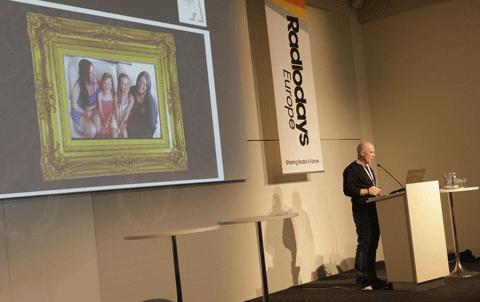
Craig: My discussion was about our 3-step process that we use to develop our teams. Finding and developing new talent for SCA, and this category, is our first and last line of defense as the media landscape continues to change and listening becomes more fractured. For programmers it’s really the only KPI that matters – find me a star, create an environment where they can express themselves and support them with feedback so they can improve.
See more about the session here.
Wayne: It was also good to see a lot of people enjoy Sam Cavanagh’s session, Hamish & Andy Down Under.
Scott: Alongside the session outlining how Valerie Weber (PD of the enormous Antenne Bayern in Munich), uses “The Hero’s Journey” as part of her programming strategy, the sessions by Craig Bruce and Sam Cavanagh were the standouts of the event – which is impressive, as there were a lot of strong sessions. And Sam’s session was a multimedia tour de force, too – it had absolutely everyone talking on day one.
Craig: Sam has been driving the “fans not listeners" agenda at SCA for quite a while now. This goes right to the heart of the opportunity for the industry to take advantage of. We have social media channels that allow us to exploit and spread our content further than we could have ever imagined. Radio content is no longer just about the next time your team is on the air. Broadcast is still the driver – don’t get me wrong – but the great shows are also focused on how they can leverage their fan bases across multiple platforms.
.gif)
See more about the session here.
THE POWER OF GREAT STORYTELLING
Peter: A common theme in many sessions was the focus (or reminder) that effective radio is built on good story telling. This was the main theme of sessions that featured some of German radio’s most successful radio stars – John Ment, Radio Hamburg, Franky Schulte, radio ffn Niedersachsen, and Arno Muller, RTL Berlin.
Craig: Loved Arno Muller – Berlin breakfast star – and his metaphor for teamwork being the inverted funnel. As opposed to everything going through his very narrow sphere of influence, he sees himself as a facilitator / ringmaster for the broader team.
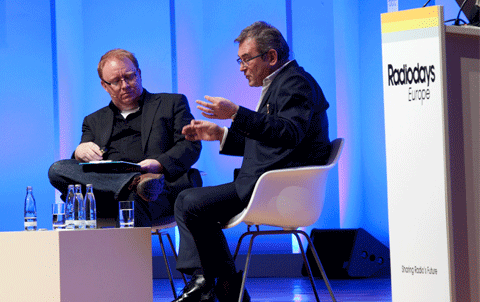
See more about the session here.
Peter: And the focus on powerful storytelling on-air, featuring Valerie Geller (US based Newstalk consultant) and Valerie Weber (PD of Germany’s most successful commercial radio station Antenne Bayern).
Alex: This was the first time I saw Valerie Geller speak and I wasn't disappointed. Another great session focusing on great content through powerful on-air story telling. I've since been preaching Valerie's message to the Russian Morning Show teams of 'Tell the Truth', 'Make it Matter' and 'Never Be Boring'. That, together with 'There is no such thing as a boring story, only boring story tellers'!
See more about the session here.
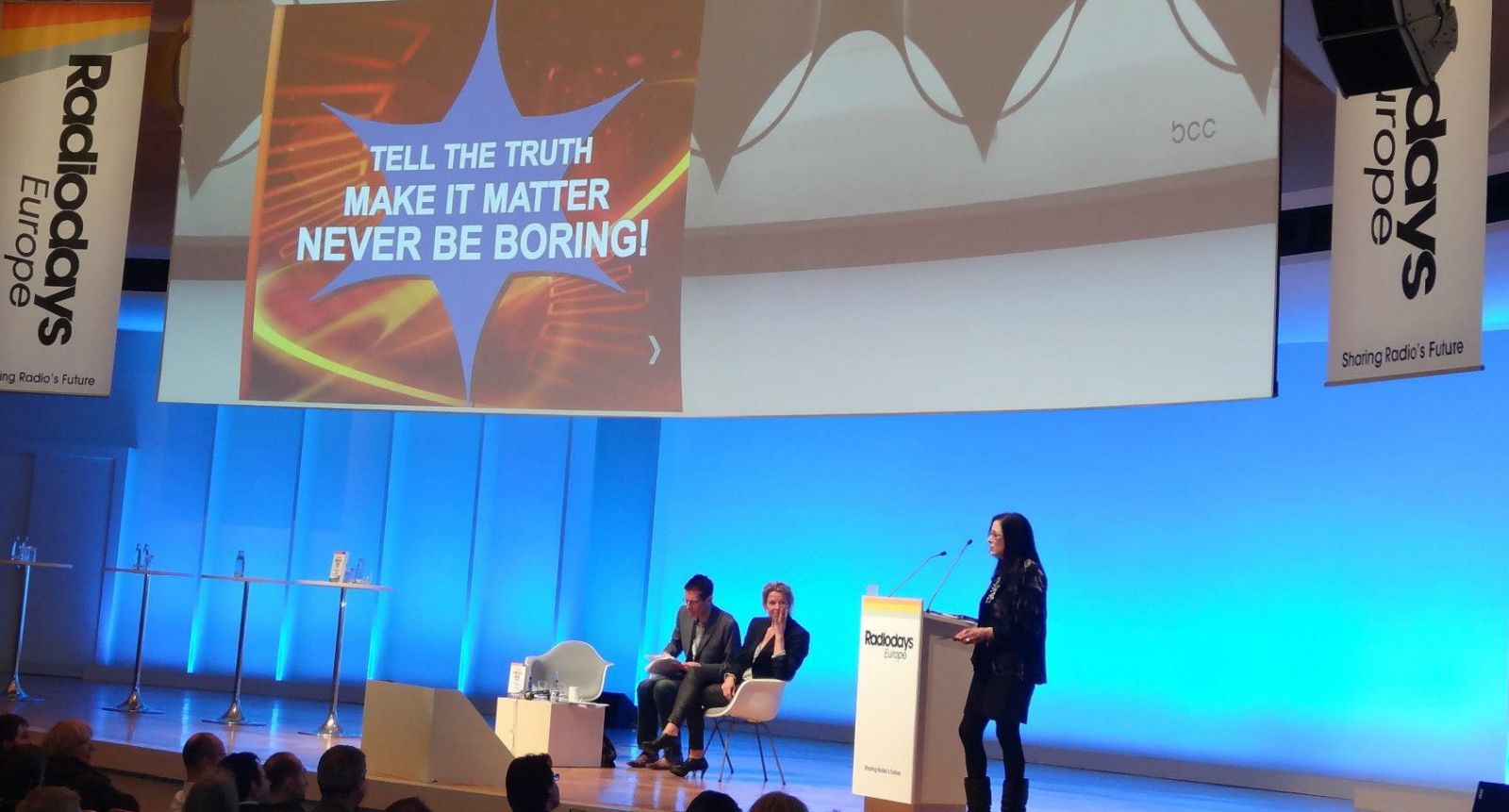
Read 'Best Radio Event in the World ?' part 2 here.
* Note: One thing of many things learned at RDE: in some countries public broadcasting and state broadcasting are not remotely the same thing.
Footnote: RDE has not given Radio Today, Scott Muller, or anyone connected with radiotoday.com.au, any contribution for publishing this article.



